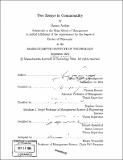Two essays in commonality
Author(s)
Arslan, Hasan, Ph. D. Sloan School of Management
DownloadFull printable version (7.304Mb)
Alternative title
2 essays in commonality
Other Contributors
Sloan School of Management.
Advisor
Thomas Roemer, Stephen Graves and Donald Rosenfield.
Terms of use
Metadata
Show full item recordAbstract
In the first part of this thesis we consider a manufacturer that introduces successive generations of products, possibly on multiple similar production lines. We consider two types of production phase for this firm; pilot production phase and full production phase. Pilot production phase for a newly developed product is an experimental production period in which a limited amount of production capacity of the production line is allocated to produce the new product so that production process of the new product is improved through cumulative production experience. At the conclusion of the pilot production phase, a production methodology is formalized and the obtained knowledge is utilized for full production. The objective of the first part of this thesis is two-fold: First, to determine how to operate the pilot production phase of a newly developed product; Second, to characterize how production processes of a new product can be improved during its full production. To achieve the first objective, we develop two separate models. First, we consider a single production line alone. We analyze how to split production between the new and existing product to maximize profits, considering that the new product typically faces low yields initially. (cont.) We show that it is never optimal to dedicate only limited capacity to the new product, - i.e., pilot production is not optimal. We then extend our view to multiple similar production lines when acquired knowledge can be passed on across production lines. We determine conditions under which launching pilot production becomes preferable. Finally, we consider the case of full production where a lead production line scans information on process improvements on a continuous basis with the remaining similar production lines during full production. In the second part of this thesis we consider a single-product inventory system that serves multiple demand classes, which differ in their backlog costs or service level requirements. We develop a model for cost evaluation and optimization, under the assumptions of Poisson demand, deterministic replenishment lead-time, and a continuous-review (Q, R) policy with rationing. We show the value from a rationing policy and how to incorporate into a multi-echelon setting the single-item model with multiple demand classes.
Description
Thesis (Ph. D.)--Massachusetts Institute of Technology, Sloan School of Management, June 2005. Includes bibliographical references (leaves 137-141).
Date issued
2005Department
Sloan School of ManagementPublisher
Massachusetts Institute of Technology
Keywords
Sloan School of Management.